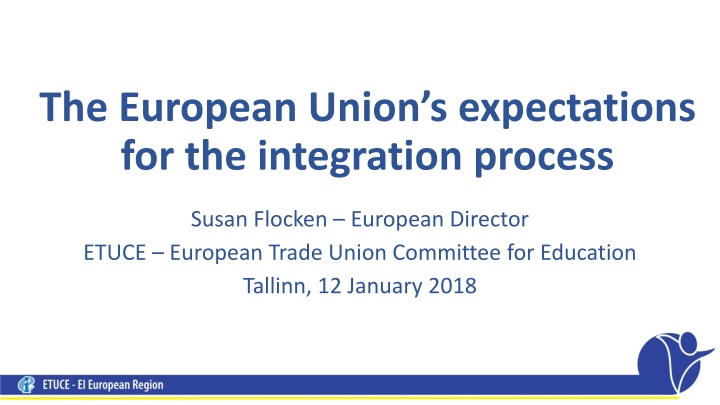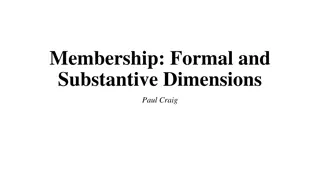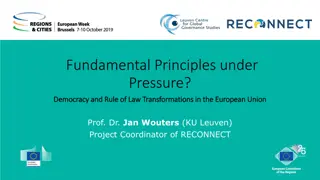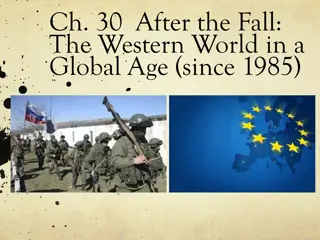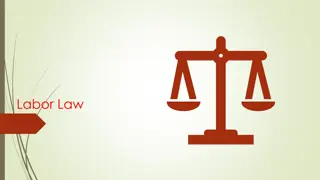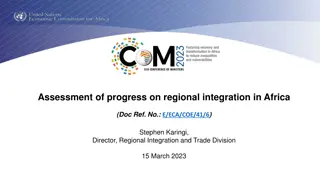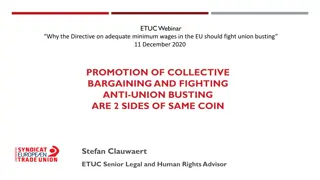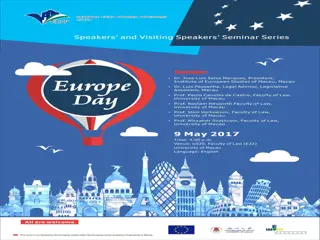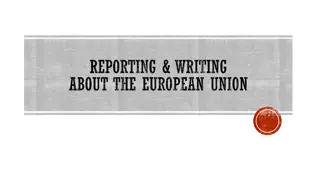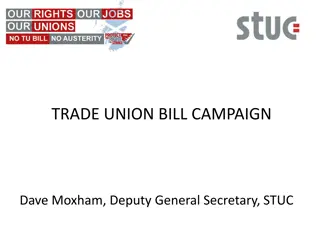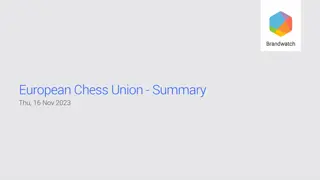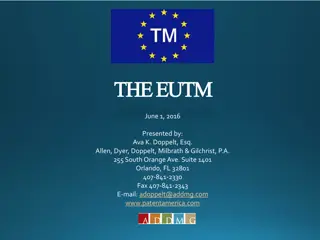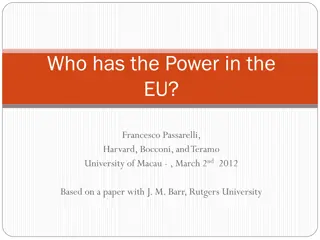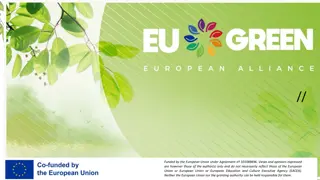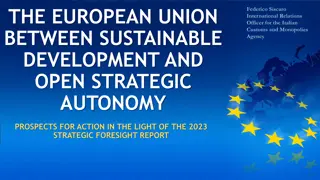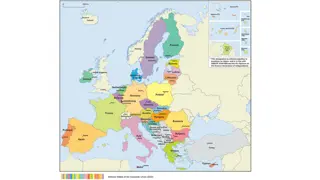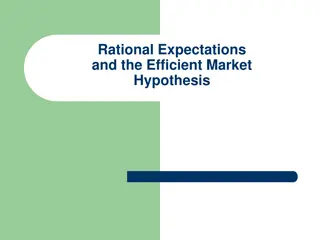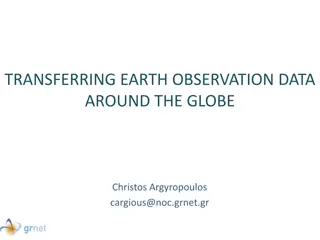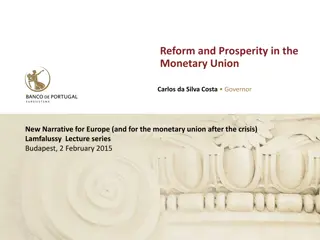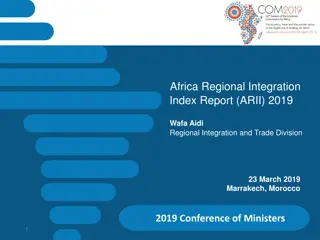The European Union’s expectations for the integration process
European Union's expectations for the integration process as outlined by Susan Flocken, European Director of ETUCE, focusing on education trade unions in Europe and the importance of education as a democratic principle. The document sheds light on the legal basis, fundamental rights, and the role of education in ensuring inclusivity and access to quality education for all, including refugee children.
Download Presentation

Please find below an Image/Link to download the presentation.
The content on the website is provided AS IS for your information and personal use only. It may not be sold, licensed, or shared on other websites without obtaining consent from the author.If you encounter any issues during the download, it is possible that the publisher has removed the file from their server.
You are allowed to download the files provided on this website for personal or commercial use, subject to the condition that they are used lawfully. All files are the property of their respective owners.
The content on the website is provided AS IS for your information and personal use only. It may not be sold, licensed, or shared on other websites without obtaining consent from the author.
E N D
Presentation Transcript
The European Unions expectations for the integration process Susan Flocken European Director ETUCE European Trade Union Committee for Education Tallinn, 12 January 2018
ETUCE in Numbers 131 education trade unions in Europe 11 million teacher and education employees (early childhood, primary schools, secondary schools, higher education and research, vocational training and professional development) Founded in 1975 1 of 5 regions of Education International
Background of the Organisation European Region of Education International European Trade Union Federation for the education sector European Social Partner in Education on EU level Member of the education working groups in the European Commission
General Legal Basis Article 2 of the European Convention on Human Rights of 1950 The right to education No person shall be denied the right to education. In the exercise of any functions which it assumes in relation to education and to teaching, the State shall respect the right of parents to ensure such education and teaching in conformity with their own religious and philosophical convictions . Article 14 of the Charter of Fundamental Rights of the European Union of 2000 The right to education Everyone has the right to education and to have access to vocational and continuing training. This right includes the possibility to receive free compulsory education, the freedom to found educational establishments with due respect for democratic principles and the right of parents to ensure that the education and teaching of their children in conformity with their religious, philosophical and pedagogical convictions shall be respected, in accordance with the national laws governing the exercise of such freedom and right.
Education as a Democratic Principle The European Court for Human Rights has raised the right to education to one of the most fundamental values of the democratic societies making up the Council of Europe (ECHR, ground 64 of Case Timishev v. Russia , 13/12/2005). As such, it constitutes a right to which every person is entitled. Broad interpretation; Universality of the right to education; States ought to take the necessary measures to ensure the accessibility of primary, secondary and tertiary education [ ] to ensure that refugee children are integrated into mainstream education facilities and have access to all ordinary education schemes.
Refugee Education in Crisis 91% of children around the world attend primary school. Only 50 % of the refugee children go to primary school. 84% of adolescents around the world attend secondary school. Only 22 % of the refugee adolescents receive secondary education. 34% of youth around the world go to University. Only 1 % od refugee youth go to University. Sources: UNESCO (2014); UNCHR (2015).
Refugee situation in Europe: Challenges The predominant focus on military and financial interests in the Mediterranean area has deepened existing imbalances and aggravated the situation of migrants, refugees and asylum seekers, including girls and women; The failure of the EU Member States to build a coherent, unambiguous, unified, and single, rather than fragmented, migration policy and subsequent legislative framework, including the basic principle of solidarity, has resulted in thousands of deaths in the Mediterranean Sea; Today, the Balkan route restrictions, segregation, fences and detentions based on alleged nationalities for thousands of migrants, refugees, asylum seekers and persons claiming international protection are undermining respect for international law as well as Europe s democratic, societal, civil and human rights values; The rise of extremist and radical movements across Europe, deeply rooted in intolerance, xenophobia and racism, due to the inability to develop a fair migration and asylum policy.
EU Challenges EU Challenges Many refugee children experience frequent disruptions and limited access to schooling. Refugee students face a number of different forms of discrimination in first- asylum country schools: bullying, isolation, prejudicial treatments, etc. Thousands of refugee children spend their entire childhoods engulfed in conflict with limited opportunities for Education. Legal restrictions to schooling, even of first asylum. Language barriers to educational access. Segregation: separated classes and educational facilities. Lack of culturally relevant curricula: ethnicity, religion and identity often mobilized and politized through education. Even those resettled refugee children who have been able to access education in their countries of first asylum are likely to have skills and knowledge far below the expected grade level for their age. Refugee instructions tend to be teacher centered, with a heavy focus on lectures and reliance on factual questions: Little participation and interaction.
Paris Declaration - Promoting Citizenship & Common Values of Freedom, Tolerance & Non-discrimination Through Education With the view to support the inclusion of newly arrived migrants (refugees) in good quality education, including by assessing knowledge and validating prior learning, in particular, through three specific objectives: 1) Ensuring that children and young people acquire social, civic, critical and intercultural competences, as well as a sense of intercultural dialogue and democratic citizenship; 2) Fostering the education of migrant children and young people, by ensuring that mainstreaming education and training systems address their particular needs; and 3) Preventing indoctrination, social exclusion and marginalisation leading to potential violent radicalisation of young people. * ETUCE is a member of the European Citizenship & Common EU values Thematic Working Group at the European Commission (ET2020)
Expectations EU institutions PRESIDENT JEAN-CLAUDE JUNCKER'S State of the Union Address, Brussels, 13 September 2017 Steady progress but insufficient, Europe the continent of solidarity, solidarity is not equally shared Call to step up efforts of member states to return illegal migrants Step up funding in humanitarian and food bank support in Africa Opening up legal pathways and stop perilous journeys Legal migration as an absolute necessity for an ageing continent EU-Turkey deal
EU Turkey Deal 18 March 2016, EU heads of state and government and Turkey agree on the EU Turkey state ent to end the flow of irregular migration from Turkey to the EU and replace it with organized and safe channels to Europe.
EU priorities EU priorities European Commission proposal for a Council Recommendation to enhance social inclusion and promote Europe's fundamental values through education and non- formal learning . ICT (Online learning courses, e.g. MOOCs) for inclusion of migrants and refugees. EU skills profile tool for third-country nationals: Online self-assessment CV intended to help identify and present migrants skills for employment, training and educational purposes. FRA reports on Migration and Education: Key obstacles to migrant adults access to tertiary education and employment persist: Recognition of competences and validation of diplomas and qualifications and language requirement for university admission.
Refugees & Education: Human Rights for All Education is a fundamental human right, one that is vital in restoring hope and dignity to people driven from their homes. Education institutions, school communities, teachers and education trade unions play a major role in helping these people see their human rights and dignity fully respected, independently of their legal status and in accordance with international law. Education helps marginalised children, young people and adults to get back on their feet, lift themselves out of poverty and participate fully in communities and society with a view of building a better future. ETUCE calls on governments in Europe to do everything in their power to respect, protect and fulfill the right to education with a view to improve education access and learning achievement among refugee children, focusing on the learning environment, teaching quality, early childhood development and accelerated learning.
ETUCE Conference Belgrade 2016 Work Programme Equality: Support member organisations and education personnel in dealing with and managing the integration of refugee children, young people and adults in education.
Education the Key to Integration & Inclusion Education personnel and their unions are key promoters of sustainable integration and inclusion [ ] yet education personnel and education institutions are left to deal with the newly arriving migrant, refugee and asylum-seeker students without receiving the pedagogical, financial or administrative support and long-term assistance that they require to competently address and cater for the needs of these students Budget cuts decrease the attractiveness of the teaching profession and lead to a shortage of qualified education personnel, especially people both competent in subject knowledge and trained to address the needs of migrant, refugee and asylum-seeker students Education trade unions are key to defending and promoting the rights of education personnel among migrants and refugees as a crucial factor in securing successful integration.
Refugees and Displaced Children Many displaced children continue to be denied access to even the most basic levels of education. Education trade unions and education institutions play a crucial role in providing refugees and migrants with quality education that meets their needs, delivered by fully trained and qualified education personnel. The ETUCE Conference resolved to provide practical support and assistance to ETUCE member organisations [ ] engaged in the provision of education and support programmes for refugee and displaced children and put pressure on governments to ensure that refugee children are given access to the full range of educational support, mental health support and resources they need to learn, achieve and succeed.
Education for Democracy The economic crisis and the refugee crisis have revealed a serious neglect of civic education, showing that, with the dominance of economic priorities, the amount of resources devoted to the social sphere is too low and political forces promoting democracy cannot grow to their full potential. European debates often overlook or ignore learning for democracy. Learning for democracy is also the key to European integration, being an integration of the economic, social and political spheres. More time is needed for education trade unions to consider how to react to the radicalisation tendencies in society and use their influence upon national education systems to restore meaningful civic education. Thanks to democratic principles, active citizenship also means that people can and should influence politics and policy through elections, and actively shape and change society.
ETUCE recent actions on EU priorities ETUCE recent actions on EU priorities ETUCE contributed to consultation on the EESC recommendations on Legal migration a legislative framework on migration and asylum is necessary, and social partners ( ) should be actively involved in its design and implementation ; a more educational, fact-based discourse is needed ( ) for making a clear distinction between asylum-seekers and economic migrants; and national governments should promote integration of third country nationals and actively combat discrimination and xenophobia . - ETUCE position paper to influence the EU Council recommendation on the promotion of EU shared values and social inclusion through formal and non-formal learning ,
ETUCE engagement on EU priorities ETUCE engagement on EU priorities cont cont Member of the EU Fundamental Rights Platform (Migration & Education); Member of the EASO-European Agency for Asylum Support Forum for Consultation; Guidelines on Legal Migration by non-EU citizens (public consultation): Assessment and recognition of foreign qualifications at Higher education level and equal treatment; Member of the EU SIRIUS network on migration/refugee education: Encourage high-quality, inclusive education for all, with specific measures to improve the support for migrants both inside and outside the school system; Research, advise and counselling on teacher training and teaching approaches and methods; Language support for teachers and for newly arrived migrants/refugees for integration; Mainstream migrant education into education policies so that it transfers knowledge and influences policy developments in order to help students from a migrant background achieve the same educational standards as their native peers
ETUCE EU ETUCE EU- -funded projects related to migration funded projects related to migration European sectorial social partners promoting the effective integration of migrants and refugees Social dialogue, DG EMPL. EU CONVINCE EU Common Values and Inclusive Education Democratic Citizenship, Erasmus+.
Education Trade Union Actions/Initiatives EI Resolutions Resolution Migration, professional diversity and racism (2015) Resolution The right to education for displaced people, refugees and stateless children (2015) EI Migration Strategy (2015) Advocate for the right to education for all migrant and refugee children, youth and adults. Defend and promote the right to teach of migrants and refugee teachers, academics, researchers and education support personnel. Promote education that respects diversity for open, democratic, multicultural and inclusive societies. EI Migrant Teachers Rights Portal
Education Trade Union Actions/Initiatives EI initiative with funding of the Open Society Fund Cooperation with other stakeholders in education Realising the right to education of refugees Mobilise School Communities for the Rights of Refugee Children and Teachers Local projects Realising the right to education of refugees Teacher Unions activate for education quality and equity for refugees and through schools The funded activities aim to establish the rights of refugee children, families and teachers, support local teachers and at promoting refugee-friendly schools, communities and municipalities. EI Stockholm Conference (November 2016):Education trade unions submit pledges for activities and events on promoting the integration and inclusion of migrants in education.
Conclusions Education as a democratic principle. ETUCE and its actions/initiatives, are committed to solidary engagement for an equal, open and inclusive society in which the background of children does not affect their education achievement. Education personnel and their unions are key promoters of sustainable integration and inclusion of refugee children. The right to education is a human right which cannot be suspended due to financial shortages in public budgets. EU Member states are responsible for granting full access to education systems and educational services to refugee children. member organisations, through different
Thank you for your attention! For more information: www.csee-etuce.org
